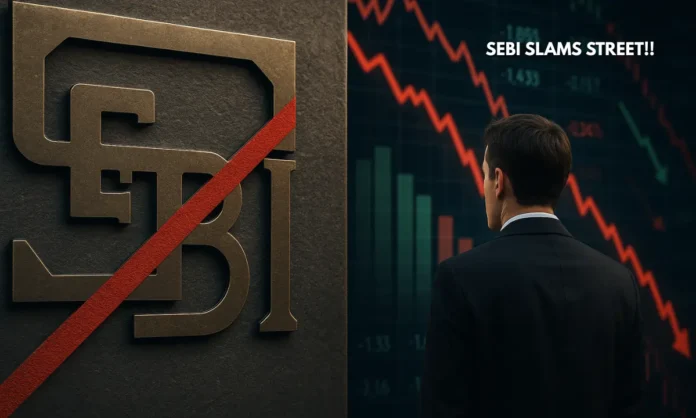SUMMARY
- SEBI bans Jane Street Group and associates from Indian markets over alleged Bank Nifty expiry manipulation.
- ₹4,843 crore in “unlawful gains” frozen; intraday trading in futures and options under scrutiny.
- Stocks of capital market intermediaries like BSE, Angel One, and Motilal Oswal fall up to 7% amid fears of declining volumes.
The Volatility Engine: How Jane Street’s Aggressive Trades Triggered a Regulatory Earthquake
In a market-shaking move, the Securities and Exchange Board of India (SEBI) on July 3, 2025, issued an interim order banning Jane Street Group and its affiliates from all activity in Indian securities markets. The action, prompted by a months-long probe into index manipulation, revealed a detailed, engineered strategy deployed by the global trading firm to allegedly influence Bank Nifty levels on expiry days—reaping illegal gains of over ₹4,843 crore in the process.
What followed was swift and brutal. Shares of capital market service providers—BSE, Motilal Oswal, Angel One, CDSL, and Edelweiss—tumbled sharply on fears of shrinking market volumes and regulatory tightening. Angel One lost over 7% in a single day. BSE tanked more than 6%. The message from the market was clear: this wasn’t just about Jane Street. It was about trust in the Indian derivatives ecosystem.
The impact of the ban is not limited to one trading desk. It questions the integrity of index expiry behaviour, the surveillance framework of Indian exchanges, and the future of high-frequency global traders operating in India’s fast-evolving market architecture.
🚨 BREAKING
— Lit🔥Xchange (@LitXchangeApp) July 4, 2025
JANE STREET IS NOW BANNED FROM INDIA'S STOCK EXCHANGE FOR MARKET MANIPULATION
$570 MILLION ARE BEING SEIZED FOR VIOLATING SECURITIES LAWS
Jane Street manipulated an index of India’s largest banks
But Citadel & Virtu said market manipulation was just a conspiracy.. pic.twitter.com/jqUu18778Y
The Market Fallout: Angel One and BSE Lead the Sell-Off
- Angel One dropped 7.32% intraday, the sharpest among brokerages.
- BSE fell 6.12%, hitting a low of ₹2,647.30.
- Motilal Oswal slid 2.62%, while CDSL lost 2.26%.
- Edelweiss Financial Services dipped by 0.91%.
The panic-driven selloff reflects deeper concerns beyond Jane Street’s exit. These firms—brokerages, depositories, and exchange operators—rely on robust trading volumes, particularly on volatile days like index expiry. Jane Street, known globally for its liquidity provisioning in derivatives, was a silent but significant player in this flow. With its exit, volatility-linked trades and institutional depth could shrink, pressuring commission incomes and order flow-based earnings for these companies.
According to analysts, the market is pricing in a potential decline in Bank Nifty derivatives volume and an uptick in SEBI scrutiny for institutional players—an ecosystem-level tightening, not just a single-entity correction.
SEBI’s Case: A Blueprint of Market Engineering
- Jane Street allegedly bought Bank Nifty futures and stocks aggressively in the morning.
- It simultaneously shorted massive volumes of Bank Nifty options, positioning for a drop.
- In the afternoon, the group reversed futures trades—selling aggressively to depress the index.
- This allowed profits on short option positions, especially near expiry cutoffs.
The manipulation, according to SEBI, wasn’t incidental—it was systematic and repeated over at least 14 separate expiry days. One key example was January 17, 2025:
- Morning: Jane Street bought ₹4,370 crore in Bank Nifty futures, sold ₹32,115 crore in options.
- Afternoon: Sold ₹5,372 crore in futures, reversing positions.
- Outcome: Bank Nifty closed lower, triggering a ₹735 crore gain in options, offsetting small losses elsewhere for a net profit of ₹673.4 crore in one day.
Such scale, precision, and directional influence point to intentional expiry-day engineering—raising concerns about the fairness of index levels, the transparency of derivatives markets, and the role of global quant firms in domestic financial ecosystems.
Regulatory Hammer: ₹4,843 Cr Impounded, Access Blocked
- SEBI froze ₹4,843 crore worth of alleged “unlawful gains” earned by Jane Street and affiliates.
- Entities barred from buying or selling any securities—directly or indirectly.
- Banks instructed to block all debit transactions from Jane Street’s accounts without SEBI approval.
- Any open derivative positions must be squared off within three months or at expiry.
The enforcement action is among the largest interim orders in SEBI’s recent history. It goes beyond restraining activity—it freezes financial movement, halts open trades, and signals to foreign players that India’s markets are not a playground for strategic expiry distortion.
SEBI’s swift action is also an attempt to reassert its credibility amid growing concerns about options manipulation, algo trading, and “expiry hijacking” by large entities. The order sets a precedent for real-time, data-backed market surveillance and shows that even sophisticated quant firms with global influence aren’t immune to domestic regulation.
The Final Tally: A System Under Pressure
The SEBI ban on Jane Street is more than a punitive order—it is a signal. A signal that expiry-day engineering is over, that volume without transparency will be penalized, and that India is willing to regulate even at the cost of foreign liquidity.
For retail investors, it’s a warning that not all volatility is organic. For institutions, it’s a call to revisit compliance, ethics, and disclosure in high-speed derivatives trading. And for the capital markets ecosystem, it’s the beginning of a recalibration—of priorities, protections, and players.
Because when ₹4,843 crore changes hands in a single day based on an engineered close, it’s not just a trade. It’s a test of the system.


